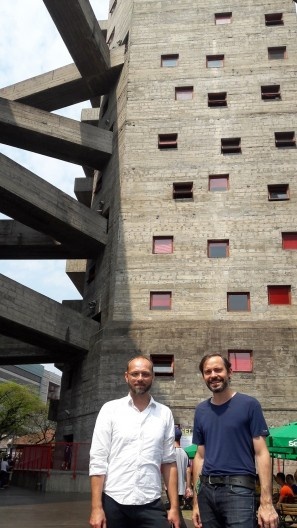
Oliver Tessmann, Tobias Walisser no Sesc Pompeia, São Paulo
Foto divulgação
GC: Can you tell us about the prize that you guys just won? why do you think you won it? Is it related to the work you do in Berlin or is it related to the work of all the three offices in Stuttgart, Sydney and Berlin?
TW: Clearly, the prize is related to the work done by all of us at LAVA, all the present and former employees in the past nine years. We are very thankful to everyone that contributed to it and of course we feel very honored for being selected for the prize in 2016. The prize is given by the Chicago Athenaeum, which is an American institution, and it's given to European architects or offices which the Athenaeum thinks that embody the spirit of European architecture is about. The prize has only been handed out for six years and it's quite interesting to see that it's not a prize for lifetime achievement for people who have already won other prizes but it's more for people whom the Athenaeum feels that should be supported in trying to redefine architecture or to add something new to architecture. We feel very honored that for instance Bjarke Ingels has won the prize a couple of years ago, our friends from Graft have won the prize... but also people like [Santiago] Calatrava or [Alessandro] Mendini, who are of course more known architects. In our case, we are new to this league but it's great for is to see that someone feels intrigued by what we are trying to define. And we haven't built many big structures so far. We haven't really published a big book on the work which we have done, and we are in the process of building something. We have two skyscrapers under development in China, we have a big university office building under construction in Saudi Arabia, which will be finished next year. We have our first major project under construction in Germany and we have a couple of smaller projects in Germany coming up very soon. It is really important for us to show that it's not just ideas but they can also be implemented and no matter what scale it is we can also show that there's a specific approach to the way in which we work. When we named our office the ‘Laboratory for Visionary Architecture’, the "laboratory" aspect might be a complicated one for some clients, because they don’t want to have the feeling that they are some sort of Guinea pig, but then if you look at how research is done... any research has a clear agenda and no one is taking a risk which is out of control. So the idea of the laboratory really means there are not so many constraints... our teams in a way they research something and then define the topics for projects. The term ‘vision’ was a problem in Germany where I grew up, in the 1980s a famous politician said that if anyone has a vision he should better see a doctor. It was totally out of fashion trying to think about future possibilities, to have an optimistic outlook into the future as Oliver explained before. So visions were totally out of fashion and for us it was important to say: but as architects you always have to have a vision because we imagine something in front of our eyes which is not there yet. We need to have a certain imagination and the desire to do something which is not just a technical calculation, with a simple equation and an optimal solution. There is intuition and there is a desire to create a humanistic aspect in the work. And this is what the Chicago Athenaeum actually honors in the prize. W e feel very much understood in what we are trying to put forward and we feel that as an appreciation of what we are trying to do. It's not easy work; we are just at the beginning.
GC: That was great! Thank you guys so much!



